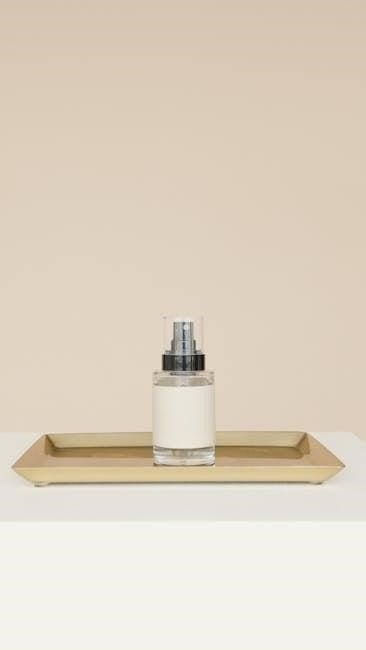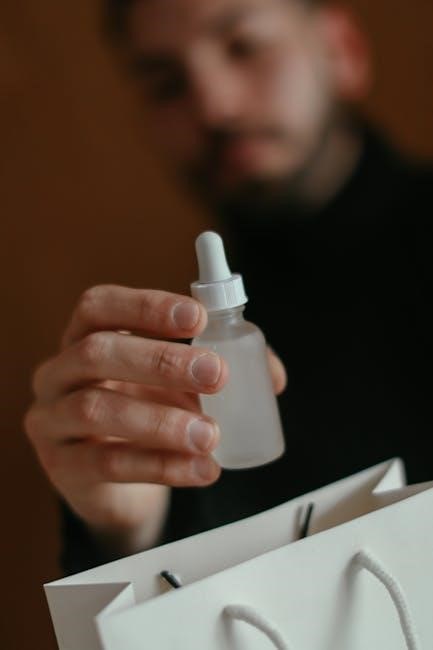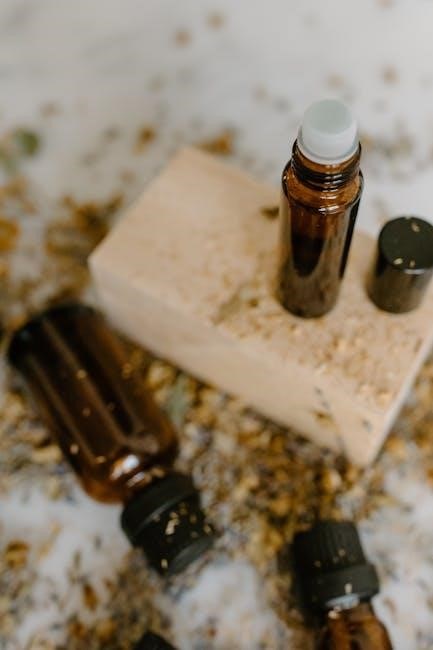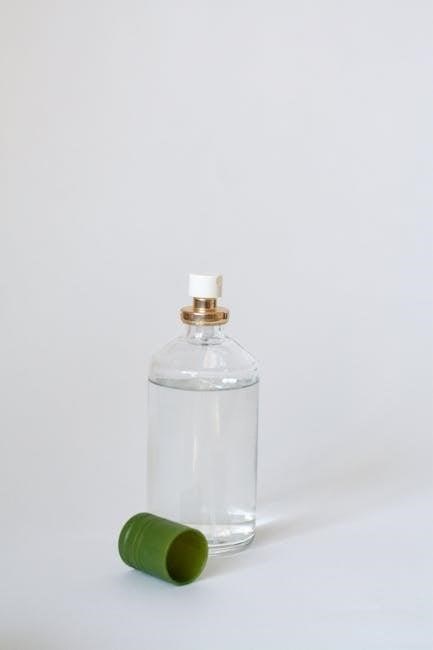Essential oils are natural, versatile extracts from plants, offering countless benefits for health, wellness, and beauty. Discover their uses in aromatherapy, skincare, and holistic well-being practices.
1.1. What Are Essential Oils?
Essential oils are highly concentrated plant extracts, often obtained through steam distillation or cold pressing. These potent oils capture the essence of plants, offering therapeutic benefits. Composed of various chemical compounds, they provide distinct aromas and properties. From lavender’s calming effects to tea tree’s antimicrobial traits, essential oils are versatile. They are used in aromatherapy, skincare, and natural remedies. Understanding their origins and properties is key to harnessing their full potential. Explore this comprehensive guide to learn more about these natural wonders.
1.2. Benefits and Uses of Essential Oils
Essential oils promote relaxation, improve mood, and offer numerous health benefits. They are widely used in aromatherapy, skincare, and natural remedies. Their versatility allows them to enhance emotional well-being, reduce stress, and support physical health. From soothing skin irritations to boosting immunity, essential oils provide natural solutions. They can also be incorporated into personal care products for their fragrance and therapeutic properties. Whether used in diffusers or applied topically, essential oils offer a holistic approach to wellness, making them a popular choice for those seeking natural alternatives.

Categories of Essential Oils Based on Properties
Essential oils are categorized by their properties, such as anti-bacterial, anti-inflammatory, and photosensitive. These classifications help in understanding their specific benefits and safe usage guidelines.
2.1. Anti-Bacterial Essential Oils
Anti-bacterial essential oils, like tea tree and lavender, are renowned for their ability to combat infections and promote healing. They are effective against a wide range of bacteria, making them ideal for natural remedies. These oils can be used to treat minor wounds, reduce inflammation, and support immune health. Always dilute them with carrier oils for safe application. Regular use can help maintain skin health and prevent bacterial growth, offering a natural alternative to synthetic antibiotics.
2.2. Anti-Inflammatory Essential Oils
Anti-inflammatory essential oils, such as frankincense, chamomile, and eucalyptus, are known for their ability to reduce inflammation and alleviate pain. These oils can be used to soothe muscle aches, joint pain, and skin irritations. Frankincense oil, for instance, has anti-inflammatory properties that can help reduce swelling and improve circulation. Chamomile oil is gentle on the skin and effective for calming inflammation and promoting relaxation. Eucalyptus oil, with its cooling effect, is often used to relieve respiratory inflammation and congestion. Dilute these oils with carrier oils for safe topical application and enjoy their natural healing benefits.
2.3. Photosensitive Essential Oils
Photosensitive essential oils, such as bergamot, lemon, lime, and grapefruit, can cause skin sensitivity when exposed to sunlight. These oils contain compounds like furanocoumarins, which react with UV light, potentially leading to sunburn or skin discoloration. To use them safely, apply photosensitive oils at night or in low-sunlight environments. Always dilute with carrier oils and avoid direct sun exposure for 12-24 hours after application. Opt for bergamot oil with bergapten removed if seeking a safer alternative for daytime use. This ensures you can enjoy their benefits while minimizing risks.

Popular Essential Oils and Their Uses
Essential oils like lavender, tea tree, frankincense, and peppermint are widely used for their therapeutic benefits, promoting relaxation, antimicrobial effects, skin health, and mental clarity naturally.
3.1. Lavender Oil: Benefits and Applications
Lavender oil, known for its calming scent, is renowned for promoting relaxation and improving sleep quality. It reduces anxiety and stress, offering emotional balance. Topically, it soothes burns, acne, and skin irritations when diluted with carrier oils. Lavender oil also supports wound healing and eases muscle tension. In aromatherapy, it fosters a serene environment, enhancing mental clarity and mood. Its versatility extends to hair care, repelling insects, and freshening spaces. A natural remedy for various ailments, lavender oil is a staple in holistic wellness practices, offering countless benefits for body, mind, and spirit.
3.2. Tea Tree Oil: Antimicrobial Properties
Tea Tree Oil, derived from Melaleuca alternifolia, is celebrated for its potent antimicrobial and antiseptic properties. It effectively combats bacteria, viruses, and fungi, making it ideal for treating acne, wounds, and minor infections. Its cleansing effects support skin health, reducing inflammation and preventing scarring. Additionally, it aids in respiratory issues when used in aromatherapy, helping to clear congestion. A natural remedy for fungal infections like athlete’s foot, Tea Tree Oil is also used in hair care to address dandruff and lice. Its versatility makes it a popular choice for holistic health and wellness practices.
Safety Considerations for Using Essential Oils
Always dilute essential oils with carrier oils before skin application to avoid irritation. Some oils, like citrus, can cause photosensitivity. Consult professionals before use, especially for children or medical conditions.
4.1. Essential Oil Dilution Chart
Essential oils are potent, so proper dilution is crucial for safe use. A general dilution ratio is 1-3% essential oil to carrier oil for adults. For children, use 0.5-1%, and for sensitive skin or elderly, 0.25-0.5%. carrier oils like jojoba or coconut oil are ideal. Always patch test before widespread use. Dilution ensures skin safety and prevents adverse reactions. Refer to a reliable chart for specific oil recommendations. Proper dilution enhances benefits while minimizing risks, making it essential for effective and safe aromatherapy practices.
4.2. Kid-Safe Essential Oils
Not all essential oils are safe for children; some can cause irritation or allergic reactions. Kid-safe options include lavender, chamomile, and bergamot, known for their calming and gentle properties. Always dilute with carrier oils like coconut or jojoba, using a 0.5-1% concentration for children. Avoid potent oils like peppermint or eucalyptus, which can be overwhelming for young senses. Consult a pediatrician before use, especially for infants. These oils can promote relaxation, soothe minor ailments, and support emotional well-being in children when used responsibly.

Applications of Essential Oils
Essential oils are versatile, offering benefits for skincare, hair health, and emotional well-being. They enhance aromatherapy, promote relaxation, and support holistic health practices naturally and effectively.
5.1. Aromatherapy and Emotional Benefits

Aromatherapy harnesses the power of essential oils to promote emotional balance and mental well-being. Inhaling these oils can uplift moods, reduce stress, and foster relaxation. Lavender oil, known for its calming properties, helps with restful sleep and soothes anxiety. Bergamot oil uplifts spirits, while frankincense promotes grounding and clarity. Essential oils can be used in diffusers, baths, or direct inhalation, offering natural solutions for emotional health. Their aromatic scents create a therapeutic environment, supporting mindfulness and emotional resilience. Incorporating aromatherapy into daily routines can enhance overall mental and emotional well-being effectively.
5.2. Essential Oils for Skin Care
Essential oils offer natural solutions for various skin concerns, from acne to aging. Tea Tree oil is renowned for its antimicrobial properties, making it effective against acne and promoting wound healing. Frankincense oil reduces inflammation and supports skin regeneration, while Geranium oil balances skin tone and hormonal imbalances. Lavender oil soothes irritations and calms sensitive skin. Diluting these oils with carriers like jojoba or coconut oil ensures safe application. Regular use can enhance skin health, reduce blemishes, and maintain a radiant complexion, making essential oils a popular choice for natural skincare routines.
5.3. Essential Oils for Hair Health
Essential oils can enhance hair health by addressing common issues like dandruff, dryness, and thinning. Lavender oil promotes scalp health and reduces dandruff, while Tea Tree oil’s antimicrobial properties prevent infections. Rosemary oil stimulates blood flow, improving hair thickness and growth. Cedarwood oil helps control dandruff and adds shine. Peppermint oil cools the scalp, reducing irritation. Dilute these oils with carriers like coconut or jojoba oil for safe application. Regular use can strengthen hair follicles, reduce frizz, and leave hair smelling fresh, making essential oils a natural solution for vibrant, healthy hair.
Blending Essential Oils
Blending essential oils combines their unique properties for enhanced benefits, allowing customization for relaxation, energy, or skincare, creating synergistic effects that amplify their natural benefits potently.
6.1. Blending for Health Benefits

Blending essential oils maximizes their therapeutic effects, creating tailored solutions for various health needs. For immune support, combine lavender, tea tree, and frankincense. Eucalyptus and peppermint ease respiratory issues, while chamomile and bergamot reduce stress. Proper dilution with carrier oils is essential for safe use, especially for children. Always consult a professional for customized blends to address specific health concerns effectively. This approach ensures optimal benefits and safety, making essential oil blending a powerful tool for holistic well-being.
6.2. Blending for Emotional and Mental Well-Being
Essential oil blends can profoundly impact emotional and mental states. Lavender and chamomile promote relaxation and reduce anxiety. Bergamot and ylang-ylang uplift mood and foster self-love. Sandalwood and frankincense enhance mindfulness and calmness. Blends like bergamot, lemon, and rosemary can improve focus and energy. Always dilute with carrier oils and use in diffusers or topical applications. Tailor blends to personal needs for maximum emotional benefits, ensuring a balanced and harmonious mental state. Proper usage enhances well-being and emotional resilience naturally and effectively.
Essential oils are powerful, natural tools offering diverse benefits. From health to emotional well-being, their versatility makes them invaluable. Explore and incorporate them mindfully for a holistic lifestyle.

7.1. Final Thoughts on Essential Oils
Essential oils are a remarkable gift from nature, offering holistic benefits for health, wellness, and emotional balance. Their versatility in aromatherapy, skincare, and daily applications makes them invaluable. Always prioritize quality, safety, and proper usage to maximize their potential. Whether for relaxation, healing, or personal care, essential oils provide natural solutions that empower individuals to take charge of their well-being. Embrace their aromatic wonders and explore their diverse uses mindfully, ensuring a harmonious integration into your lifestyle for lasting benefits.
7.2. Encouragement to Explore and Use Essential Oils
Embark on a journey with essential oils, discovering their transformative power for health and well-being. From soothing stress to enhancing skincare routines, these natural extracts offer endless possibilities. Experiment with blends, explore their unique properties, and integrate them into your daily life. Whether you’re seeking relaxation, energy, or natural remedies, essential oils provide a safe and effective way to nurture body and mind. Start small, learn about their benefits, and unlock the full potential of these aromatic wonders for a more balanced and vibrant life.
